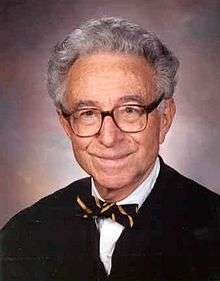Daniel Mortimer Friedman
Daniel Mortimer Friedman (February 8, 1916 – July 6, 2011)[1] was a United States Circuit Judge of the United States Court of Appeals for the Federal Circuit and previously was Chief Judge of the United States Court of Claims.
Daniel Mortimer Friedman | |
|---|---|
 | |
| Senior Judge of the United States Court of Appeals for the Federal Circuit | |
| In office November 1, 1989 – July 6, 2011 | |
| Judge of the United States Court of Appeals for the Federal Circuit | |
| In office October 1, 1982 – November 1, 1989 | |
| Appointed by | operation of law |
| Preceded by | Seat established by 96 Stat. 25 |
| Succeeded by | Alan David Lourie |
| Chief Judge of the United States Court of Claims | |
| In office May 19, 1978 – October 1, 1982 | |
| Appointed by | Jimmy Carter |
| Preceded by | Arnold Wilson Cowen |
| Succeeded by | Seat abolished |
| Solicitor General of the United States Acting | |
| In office January 20, 1977 – March 28, 1977 | |
| President | Jimmy Carter |
| Preceded by | Robert Bork |
| Succeeded by | Wade H. McCree |
| Personal details | |
| Born | Daniel Mortimer Friedman February 8, 1916 New York City, New York |
| Died | July 6, 2011 (aged 95) Washington, D.C. |
| Political party | Democratic |
| Spouse(s) | Dr. Elizabeth Ellis |
| Children | 4 stepchildren |
| Education | Columbia University (A.B.) Columbia Law School (LL.B.) |
Education and career
Born in New York City, New York, Friedman received an Artium Baccalaureus degree from Columbia University in 1937, and a Bachelor of Laws from Columbia Law School in 1940. He entered private practice in New York City until 1942, and was briefly an attorney for the Securities and Exchange Commission in Philadelphia, Pennsylvania and Washington, D.C. in 1942 before serving in the United States Army during World War II, from 1942 to 1946. Following his military service, he returned to the Securities and Exchange Commission until 1951, when he became assistant chief of the appellate section of the Antitrust Division in the United States Department of Justice, in Washington, D.C. In 1959, he joined the Office of the United States Solicitor General, serving as an assistant to the solicitor general from 1959 to 1962, then as a second assistant to the solicitor general until 1968, and then as first deputy solicitor general until 1978. He was the Acting United States Solicitor General in 1977.[2]
Federal judicial service
On March 22, 1978, Friedman was nominated by President Jimmy Carter to become Chief judge of the United States Court of Claims, to the seat vacated by Chief Judge Arnold Wilson Cowen. Friedman was confirmed by the United States Senate on May 17, 1978, and received his commission on May 19, 1978. When the Court of Claims was abolished during the Reagan Administration he was reassigned on October 1, 1982, by operation of the Federal Courts Improvement Act, 96 Stat. 25, to be a United States Circuit Judge of the United States Court of Appeals for the Federal Circuit. He assumed senior status on November 1, 1989, and served in that capacity until his death on July 6, 2011, in Washington, D.C.[2]
Legacy
In cooperation with former clerks of Friedman, the Federal Circuit Bar Association in 2012 established the Friedman Memorial Committee to honor Friedman's memory, spirit, and accomplishments. The Committee organizes a prestigious annual lecture, the Judge Daniel M. Friedman Appellate Lecture, to advance the field of appellate advocacy.[3] The first annual lecture on November 16, 2012, featured Chief Judge Frank H. Easterbrook of the United States Court of Appeals for the Seventh Circuit.[4]
References
- "In Memory: Judge Daniel M. Friedman". Patently-O.
- Daniel Mortimer Friedman at the Biographical Directory of Federal Judges, a public domain publication of the Federal Judicial Center.
- The Friedman Memorial Committee and Judge Daniel M. Friedman Appellate LectureArchived 2013-10-29 at the Wayback Machine
- Audio recording of the first Annual Lecture, featuring Chief Judge Frank H. Easterbrook, on November 16, 2012 Archived May 13, 2013, at the Wayback Machine
Sources
- Daniel Mortimer Friedman at the Biographical Directory of Federal Judges, a public domain publication of the Federal Judicial Center.
- FJC Court of Federal Claims biography of Daniel M. Friedman
- United States Court of Appeals for the Federal Circuit: A History: 1990–2002 / compiled by members of the Advisory Council to the United States Court of Appeals for the Federal Circuit in celebration of the court's twentieth anniversary. Washington, D.C.: U.S. Court of Appeals for the Federal Circuit. 2004. LCCN 2004050209.
- Daniel Mortimer Friedman at Find a Grave

| Legal offices | ||
|---|---|---|
| Preceded by Robert Bork |
Solicitor General of the United States Acting 1977 |
Succeeded by Wade H. McCree |
| Preceded by Arnold Wilson Cowen |
Chief Judge of the United States Court of Claims 1978–1982 |
Succeeded by Seat abolished |
| Preceded by Seat established by 96 Stat. 25 |
Judge of the United States Court of Appeals for the Federal Circuit 1982–1989 |
Succeeded by Alan David Lourie |